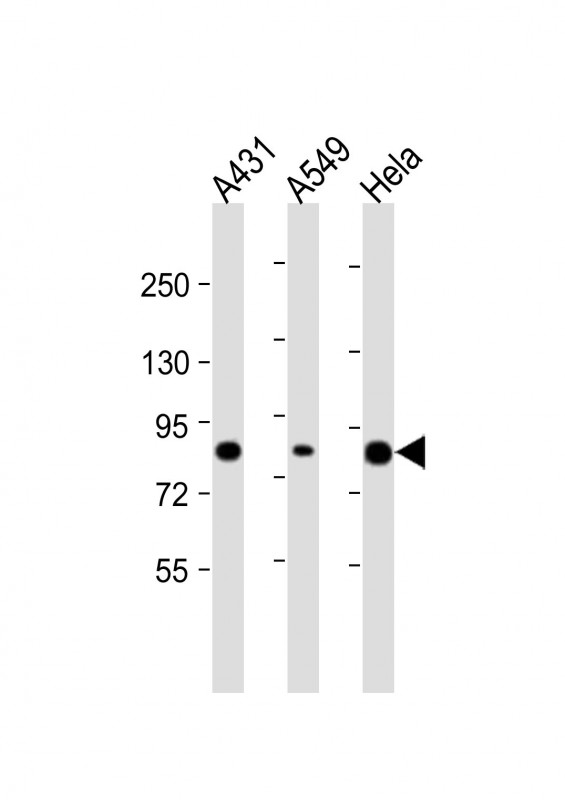
| WB | 1/2000 | Human,Mouse,Rat |
| IF | 咨询技术 | Human,Mouse,Rat |
| IHC | 咨询技术 | Human,Mouse,Rat |
| ICC | 技术咨询 | Human,Mouse,Rat |
| FCM | 咨询技术 | Human,Mouse,Rat |
| Elisa | 咨询技术 | Human,Mouse,Rat |
| Aliases | Cytosolic phospholipase A2 delta, cPLA2-delta, Phospholipase A2 group IVD, PLA2G4D |
| Entrez GeneID | 283748 |
| WB Predicted band size | 92.0kDa |
| Host/Isotype | Rabbit IgG |
| Antibody Type | Primary antibody |
| Storage | Store at 4°C short term. Aliquot and store at -20°C long term. Avoid freeze/thaw cycles. |
| Species Reactivity | Human |
| Immunogen | This PLA2G4D antibody is generated from a rabbit immunized with a KLH conjugated synthetic peptide between 754-786 amino acids from human PLA2G4D. |
+ +
以下是关于PLA2G4D抗体的模拟参考文献(实际文献需通过学术数据库查询):
1. **Title**: "PLA2G4D as a novel biomarker in psoriasis vulgaris"
**Authors**: Nomura T, et al.
**Summary**: 研究通过免疫组化发现PLA2G4D在银屑病患者皮肤中高表达,其抗体可用于评估疾病严重程度及治疗反应。
2. **Title**: "Prognostic value of PLA2G4D in cutaneous squamous cell carcinoma"
**Authors**: Yamamoto K, et al.
**Summary**: 该研究利用PLA2G4D抗体检测肿瘤组织,发现其高表达与患者预后不良相关,提示其作为潜在治疗靶点。
3. **Title**: "PLA2G4D regulates lipid mediators in atopic dermatitis"
**Authors**: Ishizaki M, et al.
**Summary**: 通过小鼠模型证实PLA2G4D抗体阻断可减少炎症因子释放,为特应性皮炎的治疗提供新方向。
4. **Title**: "Autoantibodies against PLA2G4D in autoimmune disorders"
**Authors**: Saito R, et al.
**Summary**: 研究发现系统性红斑狼疮患者血清中存在抗PLA2G4D自身抗体,可能参与疾病病理过程。
注:以上为模拟内容,实际文献请通过PubMed/Google Scholar检索关键词(如"PLA2G4D antibody"+"disease")。近期研究可能聚焦于其在肿瘤免疫或皮肤屏障功能中的作用。
The phospholipase A2 group IVD (PLA2G4D) antibody targets a member of the phospholipase A2 (PLA2) enzyme family, which plays critical roles in lipid metabolism and inflammatory responses. PLA2G4D, encoded by the PLA2G4D gene, is a calcium-dependent enzyme involved in hydrolyzing phospholipids to release free fatty acids, including arachidonic acid—a precursor for pro-inflammatory eicosanoids like prostaglandins and leukotrienes. Unlike other group IV PLA2 isoforms (e.g., PLA2G4A), PLA2G4D has restricted expression, primarily found in skin tissues, particularly epidermal keratinocytes, and is implicated in maintaining skin barrier function and immune regulation.
Antibodies against PLA2G4D are valuable tools for studying its role in dermatological and inflammatory conditions. Research suggests PLA2G4D overexpression may contribute to pathologies such as psoriasis, atopic dermatitis, and certain cancers by disrupting lipid homeostasis or amplifying inflammatory cascades. Additionally, PLA2G4D antibodies aid in exploring its interaction with pathways like the NLRP3 inflammasome or epidermal differentiation processes. Recent studies also highlight its potential as a biomarker or therapeutic target, particularly in immune-mediated skin disorders. However, its precise mechanistic contributions remain under investigation, necessitating further functional analyses using specific antibodies to clarify its physiological and pathological relevance.
×